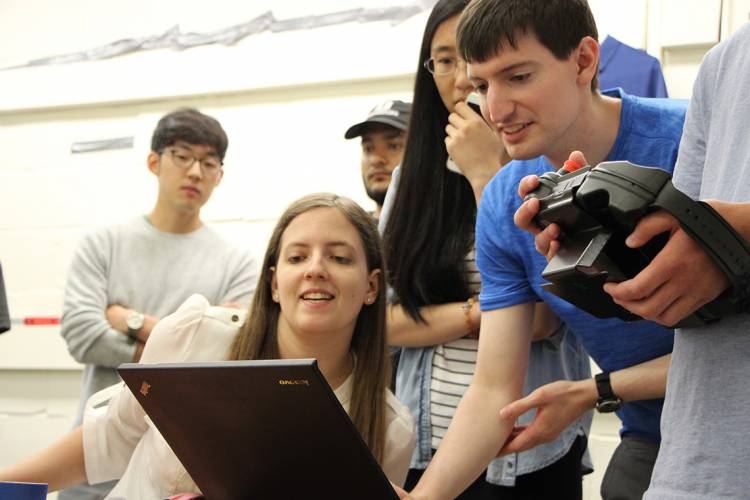Duke Students Create Robot for Amazon Challenge
Team heading to Japan for international competition of robotics experts
A group of Duke graduate students is heading to Nagoya, Japan, this month to test their skills in the Amazon Robotics Challenge, part of RoboCup, an international scientific initiative to advance intelligent robots.
Organized by faculty at the Pratt School of Engineering, Duke’s team is composed of students from a variety of disciplines including biomedical engineering, electrical and computer engineering, mechanical engineering, computer science and physics. They were selected as finalists this past November 2016 for the competition that begins July 27.
They are one of 16 teams from universities and research institutes from around the world tackling the challenge of building and programming robots capable of picking up items and packing them in boxes.
The teams will pit their robots in a test that will include object recognition, grasping objects, motion planning and task execution. The robots will earn points based on how many items are successfully picked up and stowed in a fixed amount of time. The teams will also discuss their approaches with the judges.
After an 8th place finish last year, Team Duke’s faculty adviser Kris Hauser said he is excited to once again take his team to the state-of-the-art robotics competition. This time around he believes the team can place at least in the top five, and has encouraged his students to shoot for the win.

“This is really the quintessential robotics challenge. It's a very complicated system that needs to be put together,” Hauser said.
The key technical challenge, he said, is to design a robot that can accomplish what human pickers do in warehouses millions of times a day--automatically recognize and pick up thousands of different objects, not just a few known ones.
“Robots in factories are typically custom-engineered only to pick up one type of object, but our system must be able to cope with a wide variety of objects and situations,” he said. “You need to have perception melded with hardware melded with planning and all of these different components have to be working together.”
For the students, captained by Duke BME PhD student Mark Draelos, this challenge is an opportunity to fill Amazon’s real need for a warehouse sorting robot while gaining experience and insights into product development that may help them in their careers.
Fan Wang is Team Duke’s motion planning lead, which means she is responsible for giving the robot the tools it needs to decide how and where to move. “We’re doing a lot of improvement on sensing and smart computation so the robot can do warehouse stocking and other tasks automatically,” said Wang, a graduate student in electrical and computer engineering.
One goal of the Amazon competition is to push researchers to find solutions to real world problems, all with a spirit of international competition and collaboration. At Duke, that goal has been met. Wang said the students are excited to go up against the best in the field and to challenge themselves with a complex and innovative project.
“This is a challenge I’ve never encountered before. I think after working on this I’ll have a lot of insights of how it’s done in industry,” Wang said.